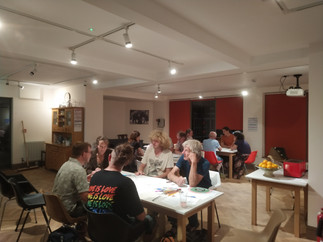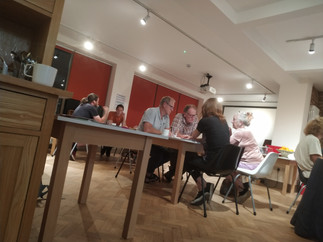If you are visually impaired, or would rather listen than read, here is an audio recording of the blog.
What if every aspect of our lives contributed positively to our health and wellbeing?
What if we taught our children how to live within environmental limits, but lead flourishing lives?
What if our country’s prosperity was measured by our wellbeing, not an arbitrary mathematical calculation?
These are just some of the big questions that we asked (and answered) at our first imagination workshop in Crediton. These intimate, informal workshops are intended to address a very fundamental problem – that we imagine our futures in the negative and we struggle to find the time, space and like-minded people to think about what a positive future might look like, breaking out of the sea of negativity that surrounds us.
That negativity is far from unfounded. We face so many crises and it feels like things are getting worse across the board. But if we want to do anything about that in a serious way, we need to picture the goal we’re aiming for, so we can find the path to get there.
Our first imagination workshop was intended to break down some of those barriers – giving people a dedicated evening, like-minded collaborators, guided exercises and of course some hearty food to feed imaginations.
Imagination toolkit
Imagination is not an easy task – there are so many barriers to break through that most people will need some help to draw out those amazing ideas hiding inside their heads. This workshop was the first chance to test some of those exercises that will make up our imagination toolkit. You can download our imagination resources for your own use here.
Impossible Train
Firstly, we watched the excellent Impossible Train animation created by Moral Imaginations – a wonderful, immersive video which helps to set people in the right frame of mind to imagine. I was so impressed by how participants were inspired by the exercise and began talking immediately about system change, about the need to shake things up. Within minutes of the workshop starting, we were already talking about a wellbeing economy vs a GDP economy!
Draw like a child
Our next exercise was a bit of fun to get people talking and out of their shells. When you were a child, there were no limits to your imagination when you were drawing – if you needed 2 heads to better converse with the aliens on your newly invented planet, then two heads you drew! This exercise was intended to get people to drop some of those barriers about what’s practical, and start thinking about what’s possible. After a more open creative exercise, we started looking at the situation cards which would form a large part of the evening’s exercises.


Participants chose one of several scenarios and drew what they’d want that future to look like – no limits. I was impressed by how some people took this seriously and came up with some insightful drawings!
Scenario-based imagining
Unless you’re an expert in a particular field, it can be hard to think, off the top of your head, how we can fix the food system, healthcare, work, education. Sometimes it can be easier to put yourself on a journey through a more personalised scenario – preparing your meals, seeking medical care, finding a job, or choosing your education path, expanding as you go along to think about how you interact with the people, animals, objects and nature around you. This scenario-based exercise is a way of easing people into imagining the bigger picture, in the hope they will broaden out to discussions about systemic change, while understanding how they will be affected.

Safe space
As participants move through this journey, they are encouraged to keep their ideas within planetary boundaries, but out of the black hole that prevents humans from flourishing – the aid is a very simplified version of Kate Raworth’s Doughnut.

Feedback
Everyone seemed to take to this exercise like ducks to water, thinking through the personal scenario, but quickly moving onto bigger concepts. We devised about 11 different scenarios covering a wide range of topics, leaving the choice to the group, so we were intrigued to see what would be chosen. Our group chose education, with a strong theme of flexibility – in the path you choose, the subjects you take, the way you’re assessed, or the qualifications you need. One younger participant described his recent education journey like being on the impossible train – once you’re on it, you can’t get off!
"school is like the impossible train - you're stuck heading in one direction and you can't get off"
Most interestingly for me, we arrived at the idea that the current education system is preparing children to add economic value to the capitalist system – one person said their son’s teacher had described their aim to make pupils ‘office-ready’. We discussed how we can shift to an education system that helps children to understand the value of all sorts of roles in society (whether they add ‘economic’ value or not), and to highly value those roles that help us stay within our ecological boundaries.
A Devon Green New Deal
There is inherent value in people simply participating in workshops like these and flexing their imaginations, but we also want to give participants agency – a sense that their ideas are being listened to and acted on. Whilst not every idea will make it into the Devon Green New Deal, the workshops will certainly shape it. We want to keep a repository of ideas – showing the diversity of thought across Devon and helping us to reflect and rethink as the GND grows.
The Devon Green New Deal will be built using many blocks:
consulting with members of the public, running imagination workshops to help them contribute their views
building up a more detailed picture by speaking to experts, running similar imagination workshops to help them think beyond their professional boundaries
providing evidence and detail for all these ideas by conducting indepth research
We’re at the first stage of this, and you can browse the ideas from this and future workshops here:
Diversity
A key value of Green New Deal Devon is understanding that access to spaces like these are often closed or narrowed to people from diverse communities – people of colour, disabled people, neurodiverse people, people from working class backgrounds, Traveller communities, among others. If we want to build a Green New Deal that is truly just and works for everyone, we need people from all backgrounds to be able to participate.
We set out organising this small workshop by targeting specific community groups across Crediton to try and attract an audience from different backgrounds – church, environmental, youth, refugee groups, and a group working on equal access to the arts for everyone. We also did a leaflet drop to some of the lower income areas in Crediton. Ultimately this approach was not particularly successful - of the groups targeted, two people from the access to arts project came. Other attendees saw the event on Facebook and heard about it through friends – inherently a more self-selecting group.
This is one of the biggest areas of improvement for GND Devon – how to make these events accessible and attractive to different groups. My immediate thought is that lack of familiarity and trust in the organisation will be a big barrier to people attending – this will be hard for GND Devon to rectify in such a large area as Devon, so the solution may be to organise events with a trusted community group.
Another solution is to use a research/survey company who have access to various types of personal data and regularly target particular groups of people for different surveys and focus groups. Regularly used by many organisations, this would be a tried and tested (and expensive) way to ensure a range of people are targeted and attend these groups, but would come with its own challenges.
What next?
This was the first workshop we have run, and the feedback from all participants was overwhelmingly positive - everyone enjoyed the chance to create and debate serious concepts. We will be running more of these in future and if you would like us to host one in your community, please do get in touch.














Comments